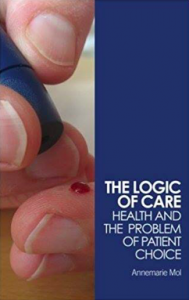© 2018 Anna Ozhiganova, Aleksandra Kurlenkova, Sergey Shevchenko, Maria Zolotukhina, Aleksandra White, Andrey Andrew
2018 — №1 (15)
Key words: Annemarie Mol, the logic of choice, the logic of care, diabetes, patient choice, chronic illnesses, care, shared doctoring, patientism.
Abstract: The reader is invited to discuss the book of a famous Dutch philosopher and anthropologist Annemarie Mol “The Logic of Care: Health and the Problem of Patient Choice” (2008), dedicated to caring for people with diabetes. Participants in the discussion represent different areas of research in the field of health and medicine, and one of them is also a member of the community of patients with diabetes, which allowed us to touch not only theoretical but practical aspects of patient care.
 DISCUSSION OF ANNEMARIE MOL’S BOOK “THE LOGIC OF CARE: HEALTH AND THE PROBLEM OF PATIENT CHOICE” (2008)
DISCUSSION OF ANNEMARIE MOL’S BOOK “THE LOGIC OF CARE: HEALTH AND THE PROBLEM OF PATIENT CHOICE” (2008)
Participants of the discussion:
Anna Ozhiganova – Candidate of Sciences, researcher at the Institute of Ethnology and Anthropology RAS
Aleksandra Kurlenkova – Candidate of Sciences, researcher at the Institute of Ethnology and Anthropology RAS
Sergey Shevchenko – junior researcher at the Institute of Philosophy of the Russian Academy of Sciences, lecturer at the Department of Bioethics of the Russian National Research Medical University named after N.I. Pirogov
Maria Zolotukhina – Associate Professor at the Department of Sociology and Advertising Communications of the Russian State University named after A.N. Kosygin, Associate Professor at the Theology Department of the National Research Nuclear University MEPhI
Alexandra White is a graduate of Columbia University (New York, USA) majoring in Biology and Medicine, Literature and Society
Andrey Andreev – sociologist, invited lecturer at the Department of Sociology, Faculty of Social Sciences, HSE
During the discussion, many critical remarks were made about Mol’s study. In particular, it was noted that the book lacks empirical details on diabetes as a disease, types of diabetes, the nature of the disease, modern technologies that facilitate the daily routine of patients, as well as how, at what age and under what circumstances diabetes is diagnosed for the first time. Some pointed out that the network of actors traced by Mol may be called incomplete. According to the discussants, there was also not enough information on clinical trials, financing and organization of medical care for people with diabetes.
Some participants emphasized that the author of the book whose intention was to oppose the logic of care with that of choice, did not offer her own meta-language for comparing them, which may put into question the theoretical weight of the work.
The participants tried to reconstruct the position (the model of choice) criticized by Mol, having defined it as neoliberal logic, within which the patient acts as a rational, well-informed customer. Why was it important for Mol to determine choice in opposition to care? After all, another understanding is possible when choice is not opposed to care but constitutes its important component.
Criticism was also caused by the very method of research proposed by Mol, her attempt to find the “clean” or “distilled” care which she suggests to see as some kind of universal model of care. Mol deliberately refuses to consider the subjective meanings and feelings of people who are given care. But does the analysis of practices (only) allow us to understand the very essence of care, in particular, caring for people with diabetes?
At the same time, important ideas voiced by Mol were also underlined. The book allows a new look at the patient’s interaction with caregivers and helps to realize the importance of coordinated teamwork directed at the successful management of diabetes. In fact, Mol made a political statement, attracted attention to care as such. The criticism of the ideal of a rational, fully informed patient who has won the right to make decisions and choose medical care is of exceptional importance. In practice, decision-making often happens situationally, in conditions when the patient does not have all the information, and the management of bodily processes becomes possible only through flexible, sensitive coordination of actions of all participants: the patient him-\herself, doctors, other professionals, family members.
One of the main issues on the agenda was the question of how key Mol distinctions – choice and care– can be applied in studies of other chronic diseases, such as AIDS, or other areas of medicine – for example, pediatrics or obstetrics where the decision-making process is somewhat different.